|
King Boxer, aka Five Fingers of Death, was a defining film of its time, both for me in my movie-going youth and for the international popularity of kung-fu movies in general. King Boxer, you see – and despite that glorious alternative title, it will forever be King Boxer for this once young genre fan – was the first Hong Kong martial arts film to be released in both the UK and America, and was thus the first one I and many of my generation got to see. It was also the first time I lied about my age to get in to see an adult rated movie. I've already related the story of how this came about in my review of Ong-Bak – I was 14 and looked older, but it took every ounce of nerve I had to face the staff of the local cinema and attempt to convince them I had come of age. To this day I don't think they believed me for a second, and suspect they let me in anyway out of sympathy for my obvious enthusiasm and barely concealed desperation. And desperate I was – the film was the talk of the playground and a dream come true for an adolescent just starting to discover the wonders of Far Eastern culture and who would have loved, just once, to have possessed the necessary skills to win just one bloody schoolyard brawl.
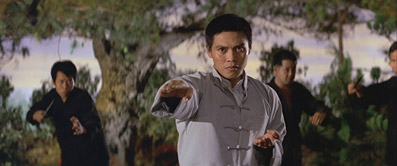
It's this very element that made the films such a hit with the male teen community of the time. Their stories of underdogs with unique fighting skills who take a beating but eventually turn the tables on their tormentors struck just the right note of wish-fulfilment, while their spectacular fight arrangement allowed would-be hard guys to appreciate the beauty of choreography and physical performance without looking like softies. It's an appeal that was not restricted to teens. In the mid-1970s, a close friend of mine occasionally visited his brother-in-law at his army base posting in Germany, and whilst there somehow got friendly with the camp's medical officer. He dropped in on him one evening for a chat, but ten minutes into their talk the M.O. looked at his watch and got up. "I'd better get ready," he remarked wearily, "it's film night, and they're showing a kung-fu movie." Apparently, every time this happened the squaddies would emerge hyped-up from the screening and start kicking lamp-posts and karate-chopping walls, and the M.O. would spend each such evening dressing flesh wounds and setting fractures and broken bones.
But I digress. The news that King Boxer was coming to UK DVD had me initially bristling with excitement, at least until it occurred to me that the only things I could clearly remember from those early viewings (I saw it twice more on a double-bill with the American-made Enter the Dragon) all those years ago was the hero's hands glowing red and a bad guy dropping from the ceiling with two fingers extended to poke someone's eyes out, not much to base a sense of excited expectation on. The film's fame, after all, comes from its status as the first Hong Kong martial arts movie to break the western market, not as the genre's crowning glory. So it was with more than a whiff of apprehension that I sat down with a glass of plonk to revisit my teenage kung-fu baptism. How would this breakthrough film look after all these years? Would it's appeal rest solely on its status as the movie that first whetted the western appetite for eastern action? No siree, not by a long shot.
Far from looking like an early stab at the genre, King Boxer plays more like the culmination of ideas, characters and action from earlier films, a bringing together of elements into a more complex and complete whole than any of its predecessors had so far achieved. In this respect, it's hard to believe that the exact reverse is true, that this was effectively an original work that became a key trend-setter, and that the density on display here was susequently diluted by others looking to cash in on the craze.
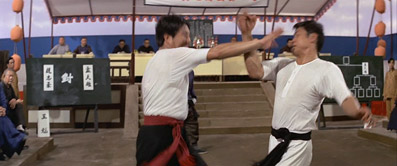
The plot certainly develops in what would become a familiar manner, but there are considerably more story threads and characters than usual to keep track of. We're thrown into the action in the opening scene, as ageing Master Sung Wu-yang is attacked by a group of shifty assailants led by bald-headed Wang Hung-chieh, all of whom scarper when Sung's daughter Ying Ying and his star pupil Chao Chih-hao come running to Sung's aid. Realising that he's not the young man he used to be, Sung suggests that Chao make his way to Po Ting county to study under the tutorship of master Seun Hsin-Pei in order to properly ready himself for an upcoming martial arts tournament. Chao's a bit reluctant because he's sweet on Ying Ying and doesn't want to leave her, but agrees to make the journey anyway. No problems identifying who the good guy is here.
Over in Ko Kui, meanwhile, cocky bully Tien-hsiung, who smokes cigarettes through a holder and habitually rubs two steel balls together in the manner of Captain Queeg from The Caine Mutiny, is busy establishing his bad guy credentials by marching though town with a posse of black-clad ruffians, who steal fruit from merchants and push over their carts. Also in town that day is a Mongolian fighter named Ba To-er, who for five dollars will allow you a shot at beating him up on the chance of winning a hundred dollars if you should somehow happen to succeed. The first poor unfortunate gets nowhere, but the second, a wild-haired and frowning fighter named Chen Lang, knocks Ba senseless with a couple of walloping head butts. Chen's about to depart with his money when he's challenged by Tien-hsuing, but the fight is stopped before it begins by Tien-hsing's father, Master Meng Tung-shun, who apologises for his son's rudeness, buys Chen a few drinks and asks him to join his team.
Paths start to cross when the leery Wang, having failed to kill master Sung as ordered, arrives back in town just in time to catch a public performance by pretty young singer Yen, whom he takes an immediate fancy to. When he attempts to grab her, she gives him the slip and runs into the very restaurant in which the travelling Chao is having a quiet meal. Wang recognises him immediately and orders his men to attack, but Chao smacks them silly and leaves Wang with a face full of dough, then completes his journey in the company of Yen and her troupe, seemingly unaware that the singer is starting to dote on him.
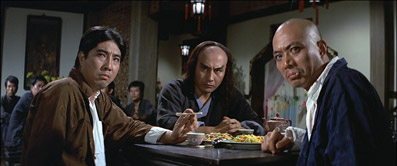
Now I should point out that after three paragraphs of plot we're essentially still on the set-up, and have another three key characters still to meet. First up there's Master Seun, who is unimpressed with Chao's abilities and has him work in the kitchen for a year, sharpening his skills on the sly by suddenly throwing spears at him to dodge and catch. Then there's Han Lung, one of the school's star fighters and whose initial contempt for Chao develops into full-blown jealousy when Chao overtakes him in the master's favour. Most dangerous of all is Okada, a deadly Japanese fighter who is brought in by Meng to put Suen's school out of business and leave the way open for his own Pak Sing school to win the martial arts contest.
One of the film's major strengths (and surprises, frankly) is that despite this unusually wide range of characters and story threads, you never for a moment lose track of who is who, a situation helped no end by giving each of the principal characters a distinctive look and personality trait. Chao fulfils all of the main expectations of a martial arts hero, being pure in spirit, dedicated to the sweet girl back home, and able to bounce back from public humiliation to prove himself to his peers. His developing skills and sense of honour see him trusted with deadly Iron Palm fighting style by his new master, but in true genre tradition, he's delivered a spectacular setback when his hands are beaten to a pulp by Tien-hsiung and the boys in a manner reminiscent of The Hustler, and he has to claw his way back to health and vengeance, all in the name of the school and his comrades, of course.
But for every familiar element there is at least one surprise. The Japanese bad guy is a genre staple, but is here afforded the status of a skilled warrior-for-hire rather than painted as inherently evil (whole schools of nasty Japanese featured in a number of genre favourites, including Hapkido and Fist of Fury), and while both Tien-hsiung and Wang are portrayed with an evil leer and a self-satisfied and scheming smile, neither are pushed to the melodramatic extremes you'll find elsewhere in the genre. Many of the performances are impressively restrained, with Lo Lieh and Shen Chan in particular keeping it real as Chao and Han, while Chiao Hsiung makes Okada a figure to be reckoned with, an imposing samurai who lets his two hairy companions soften a prey up before moving in for the kill. Expectations that Chen will be the Meng's weapon of choice are quickly dashed when his trademark head-butting technique is turned on him by Chao, while both Chen and Han find individual reasons to unexpectedly switch their allegiance. A number of scenes have managed to retain their edge even with the passing of time (the fight in the dark where instructions are called out to a blind fighter is particular highlight), but even the more familiar action is sometimes electrifyingly handled, the sort of furiously choreographed and physical combat that still gives old-school kung-fu movies a serious edge over their later wire-work equivalents. I was, I have to say, rather ghoulishly delighted to discover that the sequence in Tien-hsiung rips out an opponents eyes plays exactly as I remember, though it's taken the passing the time and a plethora of subsequent movies for me to make the connection between the two steel balls that Tien-hsiung habitually rolls in his right hand and the organic equivalents he lets drop to the floor after his attack.
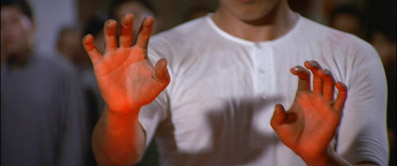
So much of what is good and even innovative about the movie is down to Korean director Jeong Chang-hwa, who spoke hardly a word of Chinese at the time and effectively had to manage the production through an interpreter. It's he who has been credited with popularising the use of trampolines to increase the height of jumps, with the dusting of clothing and surfaces with fuller's earth to emphasise blows and falls, and for expanding the complexity of this film's original story through the inclusion of some of the more memorable scenes and characters. More crucially, he handles the drama and the action with equal aplomb, the result, it is convincingly reasoned by critic David Chute, of the film being at the front end of a genre that had yet to actually become a genre – Jeong simply made the best film he could from the story rather simply move from one set-piece to another in the manner of so many of his successors.
King Boxer manages that rare genre feat of balancing its action set-pieces with a complex and well structured plot, one built from interweaving and satisfyingly concluded story strands involving a number of well-defined lead characters. The combat is thrillingly staged to camera, with the fast and physical fight choreography given charged presentation through Wang Yung-lun's scope cinematography, Jeong's eye for dynamic camera angle or movement, Chiang Hsing-lung and Kung Wing Fan's precision editing, and performers who clearly know their martial arts. As is suggested in the accompanying commentary, Warner Brothers were obviously careful in selecting which film they were going to use to introduce Eastern martial arts cinema to Western audiences. On that very commentary you'll hear a number of reasons suggested why they settled on King Boxer, but the overriding one is simple – it really is one of the best.
Those who mourn the golden days of Hong Kong Legends releases in the UK can get ready to reboot their enthusiasm, and then some. Dragon Dynasty is a label set up in the US by Hollywood producers Bob and Harvey Weinstein specifically to release key works of Asian cinema, apparently at the suggestion of a certain Quentin Tarantino, himself a major enthusiast for Far Eastern cinema and martial arts movies in particular. I gather that some of the Hong Kong Legends team were poached by the label to oversee the restoration work and transfers, and while this initially proved detrimental to UK genre releases, the welcome decision bring the Dragon Dynasty titles on the British market under Momentum's distribution is cause for celebration. And I'm not talking theoretical celebration here, at least not if the 2.40:1 anamorphic transfer on this disc is anything to go by, as there's only one word to describe it: immaculate. Honestly, if this had been shot this year I'd still be praising the picture quality, but for a 1972 Hong Kong martial arts film (scant care was taken of prints and even negatives back there and then as the films were genuinely not expected to have longevity) the image is astounding. Detail is pin-sharp, the colours pop from the screen and the contrast is for the most part excellent. Pleasingly, this appears to be no standards-converted port but a proper PAL transfer, presumably from a high-def original. A lovely job. It's almost sad to to report that this upscaled King Boxer DVD absolutely wipes the floor with the recently released UK Blu-ray of Zatoichi.
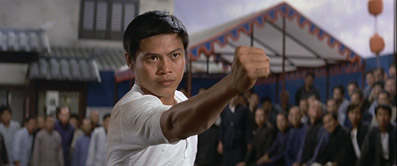
Both Mandarin and English mono 2.0 soundtracks are on offer. The dynamic range on both is better than you might expect, though there is a slight treble bias to the dialogue. Almost all traces of hiss and crackle have been removed from both tracks, though, and those lovely fight sound effects all have the expected woosh and wallop, while the famous borrowed opening bars from the Ironside theme are distortion free. The English dub, as you might expect, is full of the sort of American drawls that make it sound like a western, although this does tend to cement the Shane connection in the bar-room scenes.
Commentary by Quentin Tarantino, David Chute and Elvis Mitchell
Given that Taratino doesn't even provide full commentaries on his own movies, this must seem something of a coup, but as a dedicated martial arts movie fan-boy, the chance to talk about the film that started the genre craze in the west must have been too good to turn down. He's in good geek company here, as Chute and Mitchell match him all the way for genre enthusiasm, and while it might sometimes feel as if you've stumbled into the film room at a nerd party, these three really know their movies and what they have to say about the film, the actors, the filmmakers, the background and the genre itself is well worth listening to. Although the film is a true PAL transfer, the commentary has been taken from the US Dragon Dynasty release and has thus undergone a slight PAL speedup to stay in synch with this version, which makes Tarantino sound even squeakier than usual when he gets excited.
Interview with Director Chang-hwa Jeong (4:58)
The film's Korean director wears an impassive mask as he looks back at the film and the elements he brought to it. Brief but of real interest.
Interview with Action Director Lau Kar Wing (19:22)
Perhaps appropriately, the film's action director is a little more animated in his recollections, outlining his own industry history and some interesting details about the film (better-looking fake blood was imported from Korea), as well as commenting on the importance of Bruce Lee to the worldwide success of the genre and how fewer actors today know how to perform kung fu.
Interview with Film Critics/Scholars David Chute & Ady Klein (6:34)
In what could be seen as doubling up on the commentary, Chute and Klein nonetheless provide here a useful summation of the key points regarding the film's style and importance in genre history.
The Trailer (1:04) is in pristine condition and frankly looks as if it's been cut by someone at Dragon Dynasty from the new transfer, while the Trailer (with alternative title Five Fingers of Death) (2:47) clearly is the original American release trailer and has been rescued from what looks like third generation VHS.
There is also a Picture Gallery containing 4 posters and over 40 stills and surprisingly brief Commentary Biogs for Quentin Tarantino, David Chute and Elvis Mitchell – Tarantino in particular you'd think would warrant more than a single paragraph.
If you're not a fan of martial arts movies then it's unlikely King Boxer, for all its many merits, will convert you, but if you are then you really are in for a treat here. The transfer is superb and the extra features worthwhile, and if this is a sign of things to come from Dragon Dynasty's expansion into the UK market then bring 'em on. For genre fans, highly recommended.
|